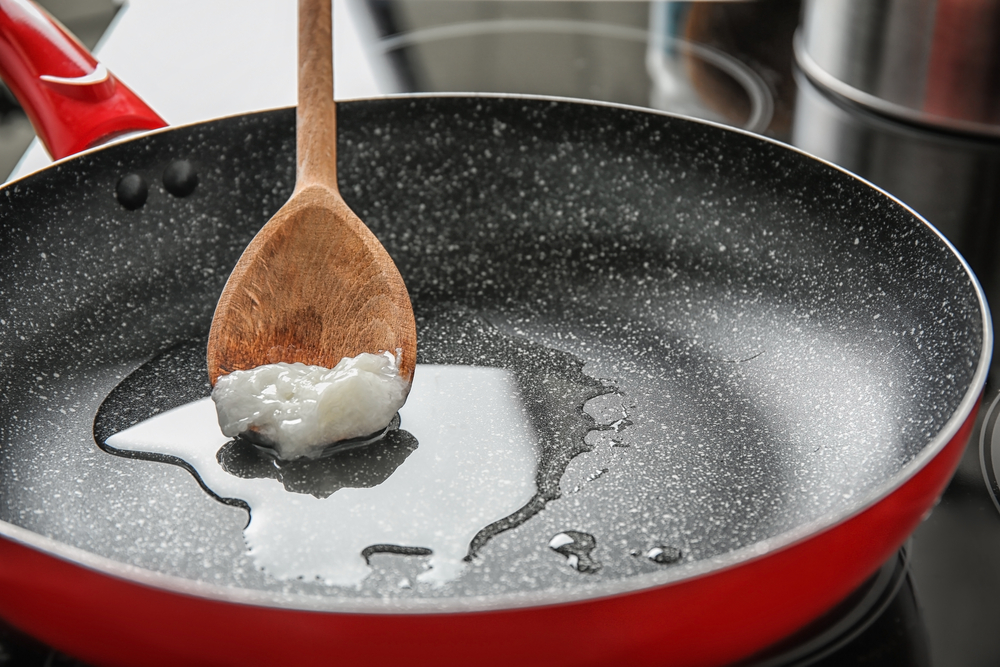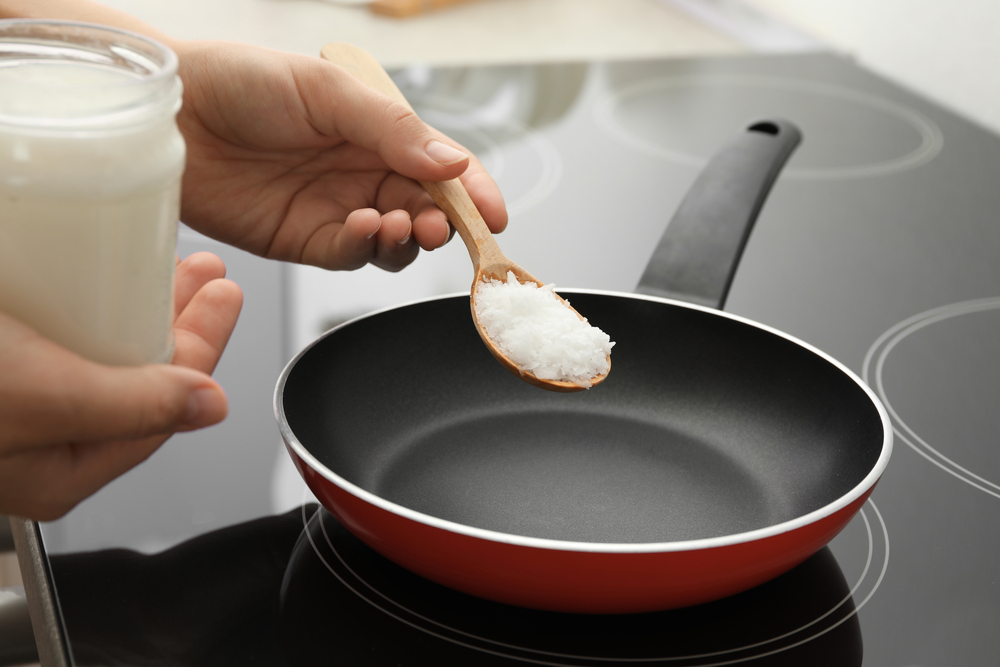- Home
- Blog
- Medical Diets
- The truth behind coconut oil
The truth behind coconut oil
Written by Catherine Saxelby
on Wednesday, 07 June 2023.
Tagged: coconut oil, guides, health, healthy cooking, nutrition, oil

Many “health gurus” tout the benefits of coconut oil. Just type the term into any search engine and you’ll be flooded with articles claiming it controls sugar cravings, is good for your heart, produces rapid weight loss, helps digestion, boosts your metabolism and even prevents the degenerative diseases of aging!
For example, culinary writers have oozed over using virgin coconut oil, saying it has a haunting, coconutty flavour. Melissa Clark, writing in the New York Times, says, “It’s even milder and richer tasting than butter, sweeter and lighter textured than lard, and without any of the bitterness you sometimes get in olive oil”.
Also known as coconut butter or cocofat, coconut oil is the trendy fat of the moment. On the one hand, it’s beloved by Paleo Passionates and Sugar-free Diet followers (who tout it as “natural” and fat-burning). On the other, the Australian Heart Foundation has it on their Avoid list, due to its high level of saturated fat. In this post, I delve into it all to unravel this conundrum.
Virgin or conventional?
Coconut oil comes in two forms: virgin and conventional. Let’s be clear on what these terms mean:
Conventional
Conventional coconut oil—the kind used to make chocolates with soft gooey centres, non-dairy coffee whiteners and movie theatre popcorn—is refined, bleached and deodorised (RBD) coconut oil. Also known as copra oil, this product is made from dried coconut flesh that is pulverized, cooked and treated with chemicals such as hexane to produce a bleached, refined oil. It is opaque, off-white in colour and has no aroma. This fat is commonly used in choc-top ice-creams, where the coating doesn’t melt until it hits your mouth. It is also rich in the fats used to make soaps, detergents, shampoos, synthetic rubber, face creams, suntan lotions and hair-styling mousses.
Virgin
About five years ago, virgin coconut oil emerged to become a popular alternative. The name probably borrowed from the olive oil terminology to distinguish itself from conventional coconut oil. It’s made from fresh coconut flesh by a milder extraction procedure than refined oils. It is supposedly cold- or expeller-pressed, which is gentler, but the process still uses some heat. You purée the flesh or meat, heat it gently and skim off the fat that rises to the top. This fat is the virgin coconut oil. I don’t understand why it’s called “cold-pressed” if it uses heat.
Proponents of this “cold-pressed virgin” coconut oil say that it’s a healthier, more “natural” fat than conventional coconut oil. Which certainly sounds true. It has a stronger coconut aroma and typically costs $3 or $4 more for a 400 mL jar (e.g. $13 compared to $9). But is it superior nutritionally?
Apart from being less damaged, there’s little difference in the macro nutrients between cold-pressed virgin and conventional coconut oil. Both contain the same high level of fat and saturated fat with almost no protein or carbohydrate.
Composition of coconut oil
| Nutrient per 100 mL | Coconut oil, conventional & cold-pressed |
| Energy, kilojoules | 3730 |
| Energy, Calories | 888 |
| Protein, g | 0 |
| Fat, g | 99 |
| Saturated, g | 82.5 |
| Monounsaturated, g | 6.3 |
| Polyunsaturated, g | 1.7 |
| Other incl trans, g | 9.0 |
| Carbohydrate, g | 0 |
| Sugars, g | 0 |
| Sodium, mg | 0 |
| Potassium, mg | 0 |
Source: USDA National Nutrient Database for Standard Reference Legacy Release Basic Report: 4047, Oil, coconut.
The research into cholesterol
Studies looking at the effect of coconut oil—either virgin or conventional—on lowering cholesterol and heart disease in humans are scarce. This makes it hard to give a firm opinion, but I’ll try.
A 2016 paper in Nutrition Reviews could find only 21 suitable research papers (8 clinical trials and 13 observational studies), from as far back as 1981, on the effect of coconut oil on heart attacks. The paper was written by New Zealand chemist Laurence Eyers in 2023.
The paper found that older studies may NOT be helpful because they used the conventional, refined form of coconut oil. What’s more, say the authors, many studies have limitations. They all suffer from having a sample size that’s too small to be statistically significant, as well as inadequate diet assessment and some form of bias.
Every study—small or large—is consistent, however, in showing that coconut oil DOES raise both total and low-density lipoprotein (LDL, often called “bad”) cholesterol. While the increase in high-density lipoprotein (HDL) may seem good, it’s overshadowed by the corresponding increase in LDL. Coconut oil raises cholesterol less than butter but more than unsaturated vegetable oils such as sunflower or olive oils. Yet despite this, many websites assert the contrary, often quoting unnamed studies to support their claims.
The high saturated-fat content may indicate that switching to coconut oil will increase your risk of heart disease. It will raise your LDL and total cholesterol levels (with lots of controversy about whether it also raises your HDL and triglycerides). Nothing is firm. At the moment, the research jury is still out.

Is there a difference between the saturated fats in coconut oil?
There was NO evidence that coconut oil acted differently to other saturated fats (something that’s often hyped). Studies comparing it to butter, beef fat or palm oil all reported coconut oil as neutral or no better than these oils.
Coconut oil is one of the foods highest in saturated fat—it is about 90 per cent saturated fat. Compare this to olive oil at 15 per cent, cottonseed oil at 27 per cent, butter at 50 per cent and ghee at 60 per cent.
What does stand out is that people in the tropics who traditionally ate coconut probably benefitted from the rest of their diet being high in fish and seafood such as prawns and octopus, high in vegetables and fruits, no processed foods, and no refined carbs, along with having an active lifestyle. They used coconut as either grated coconut flesh or coconut milk extracted from the flesh—not the commercial coconut oil we buy in jars from the supermarket.
Coconut oil’s negatives
While people rave about coconut oil, it’s good to realise that such things are never all positive. Here, I list seven negatives about coconut oil that often get lost in the hype.
1. Not rich in MCTs
Coconut oil does NOT contain a high percentage of MCTs (medium chain triglycerides) but you’ll find heaps of websites that say it does. But about half of its fatty acids (42 per cent) are lauric acid, which makes coconut fairly unusual in the world of nuts and seeds.
Lauric acid is a saturated fatty acid with 12 carbons. It is a type of fat that is processed differently by the body, so it is absorbed and metabolized more efficiently than other fats. Traditional biochemistry does not classify lauric as an MCT. Good evidence, however, shows the beneficial effects of lauric acid on lowering bad LDL cholesterol and boosting healthy HDL cholesterol.
| No. of carbons | Name of saturated fatty acid | grams per 100 g of coconut oil |
| 4 | Butyric | Less than 0.5 |
| 6 | Caproic | 0.5 |
| 8 | Carylic | 6.8 |
| 10 | Capric | 5.4 |
| 12 | Lauric | 41.8 |
| 14 | Myristic | 16.7 |
| 16 | Palmitic | 8.6 |
| 18 | Stearic | 2.5 |
Source: USDA National Nutrient Database for Standard Reference Legacy Release Basic Report: 4047, Oil, coconut.
2. NOT a source of any vitamins or minerals
Coconut oil is almost pure fat. It has no natural “goodies”. There’s no vitamin E, as in sunflower and wheatgerm oils. There’s no polyphenol antioxidants or chlorophyll, as in extra virgin olive oil. There are no carotenoids that add colour, as in red palm oil. There are no natural sterols like oryzanol, as in rice bran and maize oils. There are no omega-3s, as in linseed (flaxseed), hemp and canola oils. Coconut oil has virtually no vitamins and minerals.
3. Not a whole food or superfood
Coconut oil is NOT a whole food. Fresh coconut straight off the tree IS. Coconut oil has been extracted from copra or grated coconut flesh. It’s just another product made from the versatile coconut palm tree. Coconut oil doesn’t meet my criteria for a superfood because it doesn’t supply a high level of nutrients, unlike blueberries, salmon, spinach, citrus, almonds or spices (e.g. cloves, cinnamon, oregano). So, don’t fall for those ads promising you’ll “reap the benefits of nature’s raw foods – just as nature intended us to enjoy”, which is from an ad for Bioglan Organic Coconut Oil Virgin Cold-pressed.
4. Can’t use it for stir-fries or salad dressings
Being highly saturated, it’s very stable against oxidation and keeps well unrefrigerated for months or even years. It doesn’t develop off flavours or go rancid.
Coconut oil doesn’t have a high smoke point (the temperature at which the oil it starts to give off smoke and break down). It’s somewhere in the range of 177ºC to 196ºC, according to Cooking for Engineers. This is much less than cottonseed oil, high-quality virgin olive oil, peanut oil, and refined sunflower and canola oils. Refined oils have a higher smoke point than cold-pressed or virgin oils anyway.
While coconut oil is great for melt-and-mix recipes, it’s not that good for high-heat cooking, such as sautéing and stir-frying. You need a liquid oil like peanut or olive oil for these dishes.

5. It’s expensive
Coconut oil is expensive.
6. Not locally grown
Buying coconut oil is NOT a way to help struggling Aussie farmers. Every single coconut product I’ve seen comes from the Philippines, Thailand, Indonesia (which are major coconut growers and exporters). To reach Australia, the product has to travel lots of food miles—not good for the planet. There are no coconuts grown or manufactured in Australia, it seems. While I’m all for helping the economies of our neighbouring tropical nations, I’m an even bigger fan of supporting our local farmers by buying locally grown sunflower, canola or olive oil. I believe in avoiding long food miles unless we have to. Another reason to say “No” to coconut.
7. A high-fat food
Coconut oil is a high-fat food with a high kilojoule density. Like all fat, there’s a hefty 700 kJ in each heaped tablespoon. One tablespoon (10 g) will provide 370 kJ (88 Cals) and has 10 g of fat, of which 9 g are saturated.
The bottom line on coconut oil
Coconut fat is NOT ALL it’s hyped up to be. You can’t eat spoonfuls of it (or anything else) and expect it to cure everything from quelling a sugar craving or dissolving away unwanted fat. I wish it could!
Use it occasionally where it melds seamlessly into recipes that call for complementary ingredients such as curry, coriander, pumpkin, noodles or fish (e.g. laksa).
But don’t forget OTHER healthy oils, such as extra-virgin olive, cold-pressed mustard and macadamia oils. These have way more research backing them and better kitchen applications. Virgin coconut oil is a better fat than copha and even butter but that’s about it.
In terms of fat and kilojoules, coconut oil is no better or worse than other oils, but, nutritionally, it is a POORER choice. Substitute it spoon-for-spoon for the oil you already use.
Foodwatch
The Good Stuff
The Boring Stuff
© 2025 Foodwatch Australia. All rights reserved
Website by Joomstore eCommerce





